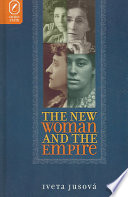

Most ebook files are in PDF format, so you can easily read them using various software such as Foxit Reader or directly on the Google Chrome browser.
Some ebook files are released by publishers in other formats such as .awz, .mobi, .epub, .fb2, etc. You may need to install specific software to read these formats on mobile/PC, such as Calibre.
Please read the tutorial at this link: https://ebookbell.com/faq
We offer FREE conversion to the popular formats you request; however, this may take some time. Therefore, right after payment, please email us, and we will try to provide the service as quickly as possible.
For some exceptional file formats or broken links (if any), please refrain from opening any disputes. Instead, email us first, and we will try to assist within a maximum of 6 hours.
EbookBell Team

4.7
16 reviewsThe New Woman and the Empire examines the intersections of gender, race, and colonial issues in the work of four culturally, socially, and nationally disparate New Women: Sarah Grand, George Egerton, Elizabeth Robins, and Amy Levy. Iveta Jusová underscores essential differences in these women's negotiations of the Victorian colonial narrative and ascertains how these authors located the fin-de-siècle New Woman project in relation to the late-Victorian colonial contest and the racially biased narratives of evolution.
Seeking to contribute to our understanding of the discursive strategies available to late-Victorian women's efforts to create space for their feminist agenda in public discourse, the book urges the reader to confront the fact that the success of these strategies was often predicated on marginalizing others. It underscores the various ways in which the work of all of the examined authors supported British imperialist efforts. Viewing much of Grand's and Robins' works' embracement of the official colonial narrative as a strategically motivated move, The New Woman and the Empire focuses on the limitations such a narrative choice placed on these authors' feminisms. But the book also highlights various discursive strategies that Egerton and Levy, and to a lesser extent Robins and Grand, forged to express a more resistant position towards both colonial narrative and evolutionary discourse.